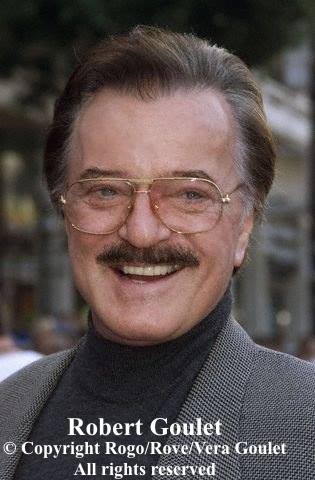
The Gazette (Montreal) 2003
Robert Goulet - he's 69 next month, but hardly looks it - comes to Theatre Maisonneuve of Place des Arts tomorrow through Sunday for eight performances of South Pacific, the classic 1949 Rodgers & Hammerstein musical.
Goulet's rousing effort in the role of the French plantation owner Emile de Becque has been hailed on every stop of a North American tour that will span 10 months before its curtain falls.
Born in Lawrence, Mass., to French-Canadian parents, Goulet was trained in Edmonton and Toronto, at 16 making his professional singing debut with the Edmonton Symphony Orchestra.
His half-century of show-business credits include radio, television, films, recording and theatre, having first appeared on Broadway in 1960 as Sir Lancelot in Camelot, opposite Richard Burton and Julie Andrews.
On the road with South Pacific in Green Bay, Wisc., the father of three and grandfather of two recently answered our 20 questions with a delightful, self-deprecating sense of humour.
1. Why are you nicknamed "The Canadian Baritone"?
(Laughs) That's the way Ed Sullivan used to introduce me. My manager finally told him, "Ed, Robert grew up in Canada, but he was born in the U.S. and he's an American citizen." (Then, doing an impeccable Sullivan impression) "Oh. And now, ladies and gentlemen, the American Canadian baritone. ..."
2. You did Sullivan's show 17 times. What did you first sing?
Richard, Julie and I did things from Camelot. The show wasn't a hit when it opened. But CBS was a sponsor, and it also owned Ed Sullivan. So we got 17 minutes on Ed's show, which was unheard of, and the next day they were lined up around the block. We were sold out, a hit after that.
3. What's the greatest musical ever staged?
Oh my God, there are some great ones. My Fair Lady was one of the great musicals, ever.
4. The one tune you're asked to sing more than any other?
If Ever I Would Leave You (from Camelot).
5. Do you sing in the shower?
Sometimes. I sing around the house, I make noises. I want to make sure my voice is still there, so I just let it fly.
6. So how do you care for those famous pipes?
If you know how to use your body when you sing, you can go almost forever - hopefully. I don't smoke cigarettes, I don't drink (hard liquor), and I don't yell and scream. If I have to say something loud (laughing, from the diaphragm), I make sure I'm using my whole body.
7. Does Zorba still travel with you and your wife, Vera?
Who told you about Zorba (one of Goulet's eight cats)? Yes. He's 8 months old and he's a monster. He's always into everything - my coffee, juice and morning paper.
8. What chore must you repeatedly be asked to do around the house in Las Vegas?
We have housekeepers and gardeners, so not much. But when there was no one there on weekends, I'd empty the cat boxes and feed the cats and dogs. I also wash the dishes. I can't stand putting a dirty dish into a dishwasher. How can you put junk in there? That's sloppy.
9. Of the thousands of appearances you've made in your career, is there one you'd like to have back?
Yes. The first time I ever sang The Star-Spangled Banner, in Lewiston, Me., before the (1965) Clay-Liston fight. I'd never sung it, having grown up in Canada. ... I got in the ring and I was scared, and I sang, "... by the dawn's early night." I messed up one word. I've sung it right 100 times since, but whenever anyone talks about Goulet and the Banner, I'm grabbing my crotch, singing la-la-la-la ... people make up things.
10. After a half-century in show-biz, you're so cool again, you're hot. How cool is that?
(Quietly) I don't think I'm cool or I'm hot. I persevere.
11.Mary Rodgers saw you in South Pacific this year. What did she think?
In May we were in New Haven, Conn., where the show first opened in 1949, and she said, "Robert, great performance, but you're holding the end of Some Enchanted Evening too long."
I said, "Isn't it OK for an artistic interpretation?" and Mary said, "Well, my father (Richard Rodgers, who co-wrote the song with Oscar Hammerstein II) had his own interpretation, so who do you think. ..." I said, "Yes. Your father." (The familiar phrase booms through the phone: "Never let her goooooooo. ...") She was right. I was holding it too long.
12. What's your enduring memory of Canada?
My grandfather's farm in Girouxville, Alta., learning how to milk cows and bale hay.
13. If you could sing a duet with anyone, who would it be?
Holy mackerel. I sang duets with Judy Garland, Julie Andrews. ... I'd like to have done something with Frank (Sinatra). That would have been nice.
14. How many songs are in your repertoire?
Thousands.
15. So surely you'll forget a lyric from time to time?
(Laughs) Almost every night. When it happens, I just create something else. One night I was doing an 81/2-minute Michel Legrand medley and suddenly I was thinking about something else. I realized, "I don't have a clue what the lyric is," so I just sang something and kept going. I made a whole story out of this song, 32 bars out of nowhere, with a beginning and an ending, an entire story that rhymed.
16. You've won a Tony for stage, a Grammy for recording and an Emmy for TV. When do you win an acting Oscar to complete the grand slam?
(Laughs) When I'm 85, some producer will feel sorry for me and give me a part in a movie where I'll play a defrocked, pedophilic, alcoholic priest. When it comes time for the voting, they'll say, "Oh well, he's an old man, he hasn't done that much and he was pretty good in this small part. He won't win, but I'll put his name down."
Everyone feels the same, and I win! I'll go up on stage, thank my producer, director, cast, my wife for putting up with me, and, of course, the audience. Then I'll go home, have a glass of wine and die. We've all got to go sometime.
17. What are you listening to today?
It depends on what my wife is carrying around. Jazz and classical. I miss music. I miss being home, because there I can put anything I want on my system. I have a very strict routine on the road. There are no big parties.
18. Is there a style of music you simply cannot bear?
Rap. (Pauses) If that's music.
19. You'll be in Montreal for about a week. What will you do away from the stage?
I'm going to find the best places in the world to have lunch. I can't have dinner and do a show at night, so you've got to do me a favour: write down a half-dozen of the best lunch places in town and leave it for me at the theatre. Merci mille fois!
20. Do you have a favourite Richard Burton story?
(Laughs heartily) He gave me a couple. But I love this one:
Richard was making a movie with Jean Simmons, who was married to Stewart Granger. This was years and years ago, and I can tell you this story that he told me - and it's true - because those guys are dead.
(Ever the actor, Goulet immediately slips into the roles of first Burton, then Granger, flawlessly imitating accent and tone.)
"Bobby, I would park the car, the MG, about a block and a half from the house and walk back. I'd climb the wall, run across the lawn, go to the woodshed door, open it up, take all the wood out and stack it neatly. Close the woodshed door behind me.
"Open the door into the living room, where the St. Bernard would be waiting for me, licking my face, and I'd give him a piece of meat that I'd brought for him specially.
"I'd climb the stairs and go to Jean's bedroom. They had separate bedrooms. She would be lying in bed with her sheets up to her neck, waving at me with one hand, smiling.
"And I'd go to the door and see where Granger was sleeping, snoring. (Almost whispering) I'd close the door and lock it and get into bed with her.
"In the morning, I'd get up, kiss her goodbye, go to unlock the door - 'Goodbye, my darling' - down the stairs, pat the dog, go out the woodshed door, put all the wood back in, stack it neatly, close the door, run across the lawn, jump across the fence, into the car and go over to the studio.
"After two weeks, I was getting rather tired.
"That Saturday night, I was invited to their place for dinner, just me as I found out when I got there. I'm at the bar, and Granger is pouring me a drink, and he's got a six-shooter in his hand. And he said ..."
(Now as Granger, slurring as though fantastically drunk):
"Richard, the studio has asked me to ..." (puts two bullets into the gun) "... do this movie, a lovers' triangle ..." (inserts two more bullets) "... where the husband finds out that his wife is fooling around with one of his good friends. (Fills the chamber and snaps it shut)
"The ending is rather, well, messy. (Granger begins to pull the hammer back on the pistol) It's something I wouldn't like. I'd like to do something ... different. (Pulls the hammer all the way back, ready to pull the trigger)
"Any suggestions?"
Goulet pauses. Then, as Burton: "Oh, I think a warning would suffice."
© (c) CanWest MediaWorks Publications Inc.

